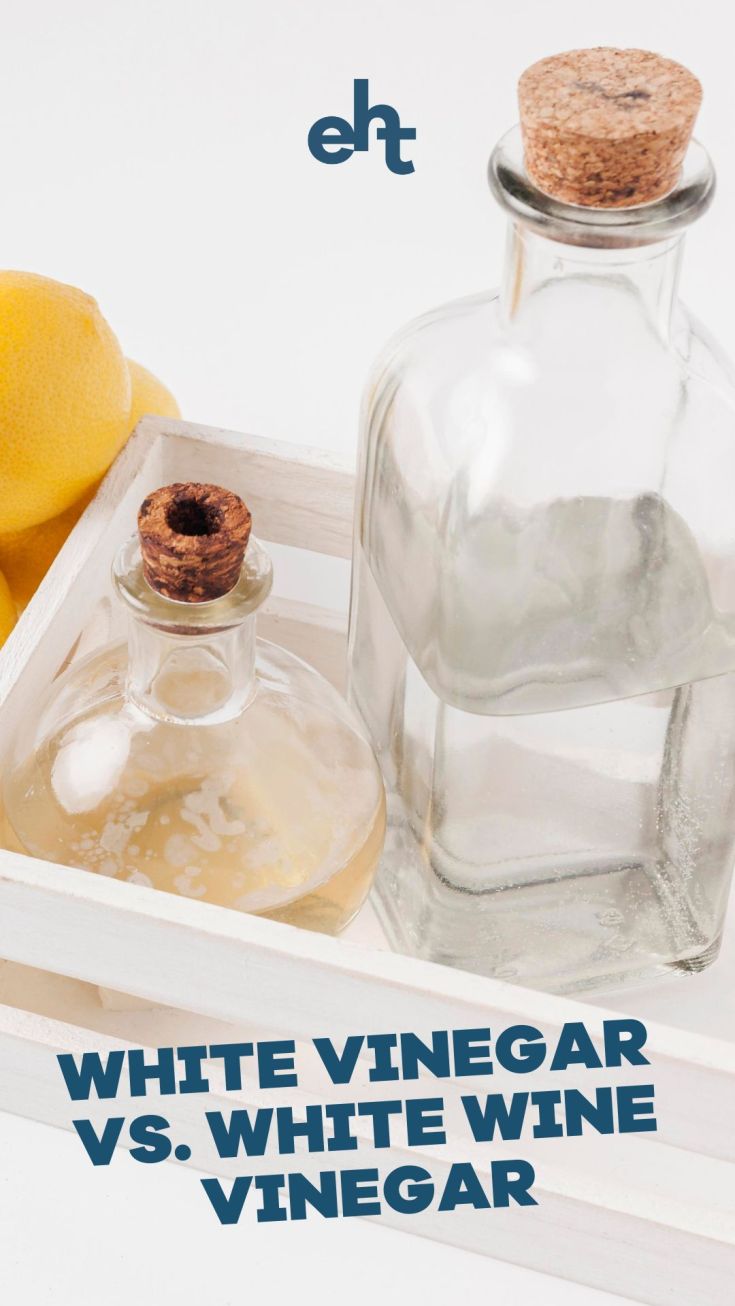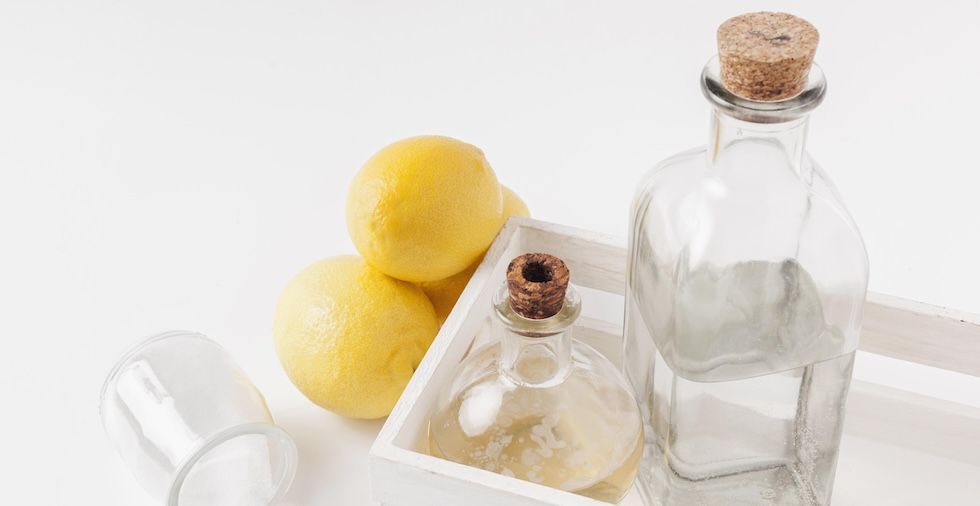- Can you swap white vinegar and white wine vinegar?
- White vinegar vs. white wine vinegar: When to use each
- Does white wine vinegar contain alcohol?
- Does white vinegar or white wine vinegar go off?
- How to choose which to buy
- Bonus: Quick white vinegar cleaning hacks
Picture the scene: You're halfway through a delicious recipe, and it instructs you to add some white wine vinegar. You overlooked that before. You quickly check the back of your cupboard to see whether you have some, but all you can find is white vinegar. Wait, can you use that instead?
Hold that thought. The truth is that there are times when you can use these two products interchangeably, but it's not always the case. In this guide, we'll look at white vinegar vs. white wine vinegar, how they're made, what they're best for, and when it's okay to switch them.
Can you swap white vinegar and white wine vinegar?
The best answer we can give you here is sometimes.
While white vinegar and white wine vinegar have very similar names, the two are pretty different, especially if you're cooking with them. Use the wrong one and you could end up with some unexpected flavours.
Let's break that down: White vinegar is much sharper and more acidic than white wine vinegar. If you're using it to replace white wine vinegar in a recipe, there is a workaround. You can dilute it with a bit of water and add a pinch of sugar. While it won't taste the same, it's close.
But what about the other way around? Put simply, white wine vinegar can be used as a substitute for white vinegar in cooking, but it won't provide the same level of strength. For pickling or anything that relies on strong acidity to get the job done, it's best to use the real thing.
To achieve the best results, use the type of vinegar specified in the recipe. While you technically can mix things up in a pinch, you don't want to make a habit out of it.
What is white vinegar?
White vinegar, also known as distilled vinegar, is made from fermented grain alcohol. It's crystal clear, has a strong smell, and packs a sharp punch. As we'll explain later, white vinegar is excellent for cleaning, pickling, and anything that needs a proper acidic boost.
One of the main components of white vinegar is acetic acid, an ingredient that you will also find in many everyday household cleaning products.
What is white wine vinegar?
White wine vinegar, on the other hand, is made from fermented white wine. For that reason, it's milder, has a more rounded flavour, and adds depth to dressings and sauces without overwhelming them. Think of this one as a classy vinegar with a touch more character.
Since it's made from grapes, white wine vinegar contains small amounts of polyphenols, i.e. natural antioxidants found in wine. For that reason, adding it to your recipes could be part of a healthy Mediterranean diet.
White vinegar vs. white wine vinegar: When to use each
Now that you're clear on the main differences between these two vinegars, let's talk about when to use each of them. While there are many ways to incorporate them into your cooking and cleaning, we've outlined the main points below.
You should use white vinegar when you need:
- Something strong and acidic for your recipes
- A strong, acidic cleaner for your kettle, tiles, or windows
- A base for pickling things like onions and vegetables
However, you should use white wine vinegar when you want:
- A mild acid for a vinaigrette or marinade (e.g. a salad dressing)
- Something that enhances a recipe's flavour rather than adding sharpness
- A better-tasting result in delicate sauces for your meals
Discover our vinegar cleaning tips, including uses for vinegar in the laundry, how to clean a dishwasher, and how to clean fruit with vinegar.
Can you clean with white wine vinegar?
You'll notice that we haven't listed "cleaning" as one of the uses for white wine vinegar. While you technically can use it for cleaning, it's not worth it. Since this type of vinegar has low acidity levels, it won't clean things as well as white vinegar.
Just remember the golden rules. White vinegar is more acidic, less expensive, and more effective for cleaning. Save your wine vinegar for cooking, where flavour matters.
Does white wine vinegar contain alcohol?
Not really. During the fermentation process, most of the alcohol is converted into acid. You might find small amounts in it, but nothing significant enough that affect you or your recipe.
Does white vinegar or white wine vinegar go off?
Worried that you've had one of these vinegars in your cupboard for too long? You needn't be! Both types of vinegar have an almost endless shelf life. That means that you can keep them and use them whenever you need, without worrying about whether they're still "good".
Of course, if you've had them a while, you might notice some minor changes in the way they look. They might go a bit cloudy or develop a harmless blob called the "mother," but that's just a sign they're unfiltered and still alive. Don't panic. If that happens, be sure to shake the bottle or strain it before using it in recipes.
How to choose which to buy
Now you've got the inside scoop on these types of vinegar, you may be wondering which one to invest in. The answer is both.
White vinegar is unbeatable for cleaning and pickling. White wine vinegar is perfect for cooking. They serve different purposes, and neither goes off. Keep one of each and you'll be covered for a whole selection of recipes and quick cleaning tricks, too.
Bonus: Quick white vinegar cleaning hacks
We've mentioned that you can clean with white vinegar, so let's dive a bit deeper. If you have a bottle of the stuff lying around, here are some cleaning hacks to try.
1. Get streak-free glass and mirrors
Start by mixing equal parts white vinegar and water in a spray bottle. Spray the concoction directly onto the glass, wipe with some newspaper, and you'll get a streak-free shine. Get more advice on how to clean glass in our other article.
2. Clean away grease and grime
Vinegar is also great for wiping down kitchen counters, stove tops, and cupboard doors. Use the spray we mentioned above to clean your kitchen. It removes grease and grime without leaving any residue.
Note: Don't use it on granite, marble, or other stone as it's too acidic.
3. Get rid of the weird smell in your fridge
Does your fridge smell a bit "off"? If you want to keep your fridge clean, white vinegar can help. Soak a cloth in a vinegar and water mix and wipe down the shelves and drawers. The acidity neutralises odours and cuts through any sticky spills.
4. Sanitise your chopping boards fast
Chopping onions, garlic, or raw meat? When you're done, spray some straight white vinegar on your board, let it sit for a few minutes, and then rinse it off. This quick hack helps kill bacteria and eliminate strong odours.
Believe it or not, white vinegar and white wine vinegar are not the same thing. While there are times when you can use the two interchangeably, we don't recommend it. That's because white vinegar has a more pungent taste and acidity than white wine vinegar. Now that you understand when to use each of them, you should have no problem finding the right product.
Q&A
Did we miss something along the way? If you have a question on your mind, you've come to the right place. Here are our frequently asked questions.
Is white wine vinegar the same as white vinegar?
No, these are two different types of vinegars. They have other ingredients, tastes, and uses. They are not directly interchangeable. However, if you find yourself stuck without the kind of vinegar you need, you may be able to substitute it occasionally.
Can I use rice vinegar instead of white wine vinegar?
Yes. Rice vinegar is very similar to white wine vinegar. It's nice and mild. That means that it works well in most recipes that call for white wine vinegar. Give it a go.
Can I use white vinegar in a salad dressing?
Technically, you can, yes. However, the result will be very sharp, and you might not like it. White wine vinegar is much better for flavour. If you do end up using white vinegar as a substitute, you can add sugar to the mix to sweeten it.
Can you pickle with white wine vinegar?
You can, but it won't be as effective as using white vinegar. That's down to the fact that white vinegar is stronger and more acidic than white wine vinegar.
Why is white vinegar better for cleaning?
There are two main reasons. The first is that it's stronger, and the second is that it leaves no lingering smell. White wine vinegar is more expensive and less effective for tackling tough cleaning jobs.
Did we answer your question? Let us know in the comments below!


Leave a Reply